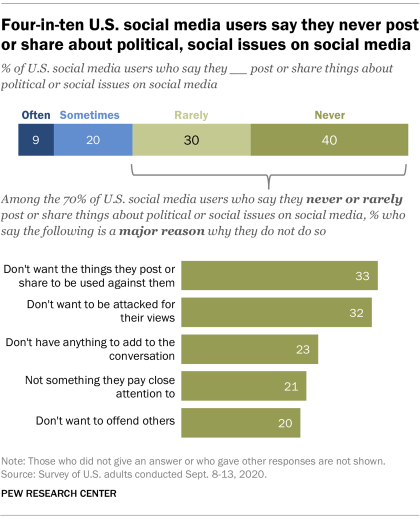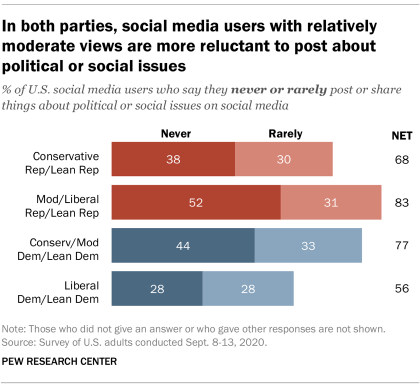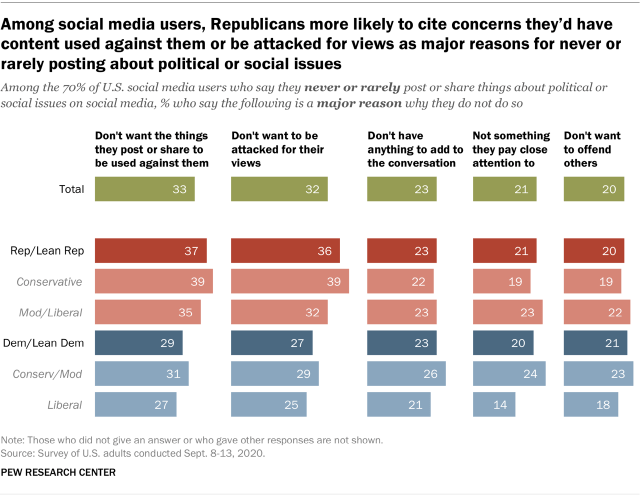Only 9% of adult social media users say they often post or share things about political or social issues on social media, according to newly released results from a Pew Research Center survey of U.S. adults conducted Sept. 8-13, 2020. Some 70% of social media users say they never (40%) or rarely (30%) do so.
When asked about five potential reasons for why they do not post about these topics, the top two reasons users cite are concerns that the things they post or share will be used against them and not wanting to be attacked for their views. About a third of those who never or rarely post or share about these issues say that each statement is a major reason.
Roughly a fifth of those who never or rarely post about these issues say that among major reasons for this are not having anything to add to the conversation, not paying close attention to political or social issues, or not wanting to offend others.
Pew Research Center has long studied the intersection of social media and politics. To explore how frequently Americans post or share about political or social issues on social media and what the reasons for not doing so might be, we surveyed 10,093 U.S. adults from Sept. 8-13, 2020. Everyone who took part is a member of the Center’s American Trends Panel (ATP), an online survey panel that is recruited through national, random sampling of residential addresses. This way nearly all U.S. adults have a chance of selection. The survey is weighted to be representative of the U.S. adult population by gender, race, ethnicity, partisan affiliation, education and other categories. Read more about the ATP’s methodology.
Here are the questions, responses and methodology used for this report.
Answers to these questions – asked of Americans last fall as the 2020 presidential election approached – vary by political party and ideology. Among social media users, Republicans and those who lean toward the Republican Party say they post about political or social issues less frequently – 74% say they never or rarely do so – compared with a smaller share (66%) of Democrats and Democratic leaners who say the same. Some 44% of Republican social media users and 36% of Democratic social media users say they never do this.
The newly released results also reflect a pattern seen in other Center explorations of political posts on social media and other political activities such as voting and activism. Those toward the center of the ideological spectrum (that is, self-described conservative or moderate Democrats, and liberal or moderate Republicans) are more likely to be reluctant about engaging on social media than those at the edges of the spectrum (liberal Democrats or conservative Republicans).
Among social media users, Republicans who identify as moderate or liberal are 15 percentage points more likely than conservative Republicans to say they never or rarely post or share about political or social issues (83% vs. 68%). Similarly, roughly eight-in-ten conservative or moderate Democrats who use social media (77%) say they never or rarely post this type of content, compared with a smaller share of liberal Democrats (56%).
These new results are consistent with other Pew Research Center findings about the relatively modest prevalence of political posts on social media. For example, a Center analysis of tweets posted by U.S. adults with public accounts from June 2018-June 2019 found that only 13% of tweets mentioned national politics. Just 6% of these users were classified as “prolific political tweeters” (posting at least 10 tweets during that period, with at least a quarter of those tweets being about national politics). This pattern is not just specific to politics: A 2020 analysis found that a minority of users produce the vast majority of tweets more generally. Still, in a separate study during the recent election season, 55% of Americans said they were worn out by political posts on social media, with Republicans more likely to say this than Democrats.
There are also numerous ways social media users can be politically or socially active on social media, and these can vary based on current events. Some 14% of U.S. adults reported they had used a hashtag related to a political or social issue in the past year when asked about these issues in a 2018 survey, and 18% had changed their profile picture to show support for a cause in that same time frame. In a June 2020 survey conducted in the wake of global protests against racial injustice, roughly one-in-five social media users (18%) said they had used such a hashtag in the past month, while about a third (36%) had posted a picture to show their support for a cause.
Several potential reasons for not posting or sharing content about political or social issues are cited as major ones by similar shares of Democrats and Republicans in this new survey. There are other areas, however, where partisan and ideological differences stand out.
For instance, Republicans who use social media but post about these issues infrequently are more likely than their Democratic counterparts to say concern that this content could be used against them is a major reason they don’t post in this way (37% vs. 29%). They are also more likely to say a major reason is that they don’t want to be attacked for their views (36% vs. 27%) – and conservative Republicans are more likely than moderates or liberals within the party to cite this as a major reason for rarely if ever posting.
Other Center research has examined political discourse and perceived harassment both offline and online: For example, Republicans reported a less “comfortable” environment for expressing their views in a 2019 Center study on political discourse, and another recent study revealed that half of Americans who have experienced harassing behaviors online think this was a result of their political views.
When it comes to other major reasons someone might not post about political or social issues, similar shares of Democratic and Republican social media users who never or rarely do so cite not wanting to offend others, not paying close attention to these issues or not having anything to add to the conversation. Among Democratic social media users, however, infrequent posters who identify as conservative or moderate are more likely to say the latter two reasons are major ones, compared with their liberal counterparts.
Note: Here are the questions, responses and methodology used for this report.



